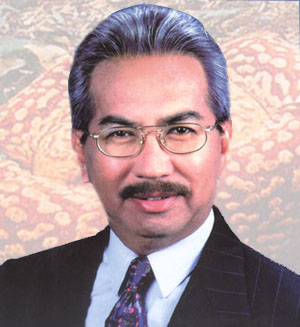Datuk Seri Panglima Haji Musa bin Haji Aman (born 30 March 1951), is the 14th and current Chief Minister of the state of Sabah in Malaysia. He took over the post from Chong Kah Kiat on March 27, 2003. His appointment as Chief Minister marks the end of the rotation system used in Sabah whereby the Chief Minister post is rotated every two years among the three main racial groups in Sabah: Christian Bumiputras, Muslim Bumiputras, and the ethnic Chinese. He is also the chief of United Malays National Organization (UMNO) for Sabah.
Political career
Datuk Musa's political career started on March 8, 1992, when he contested and won the Jambongan UMNO division chief's post (now known as Libaran division) and was appointed as Sabah Barisan Nasional (BN) treasurer eight days later.
On March 7, 1995, a year after BN came to power in Sabah, Musa became the director of Sabah Foundation (Yayasan Sabah), a Sabah statutory body. In March 1999 he resigned as the Sabah Foundation Director to contest in the state elections and defend the Sungai Sibuga State Legislative Assembly seat, defeating Ramli Noordin (PBS) by 4034 majority votes, the highest majority among the 24 seats contested by UMNO.
He moved up further in his political career when he was appointed Minister in the Chief Minister's Department under Datuk Osu Sukam in 1999. On March 27, 2001, he became the Finance Minister in Tan Sri Chong Kah Kiat's cabinet. On September 28, 2001, Musa replaced Osu Sukam as the Sabah UMNO Liaison Committee Chairman, which paved the way for him to be the Chief Minister. He assumed office as Sabah's Chief Minister on March 4, 2003, and is currently in his third term.
Economic policy
Soon after taking his oath of office as Chief Minister, Datuk Musa outlined his agenda for the state. He had set his priorities on agriculture, tourism and manufacturing, putting them in what he calls the state's 'Halatuju' development framework, and supporting them by placing human resource development high on his agenda.
To support the first pillar of his 'Halatuju' campaign, tourism, a commitment of RM1.4 billion in federal funds was secured towards the building of a new Kota Kinabalu airport terminal, which was completed in 2008, ahead of schedule. A part of the old Kota Kinabalu port with warehouse facilities dating back to the early 1900s was transformed into Jesselton Point, a modern port with a high-class ferry terminal and other facilities. Under Datuk Musa tourism registered significant growth: Tourist arrivals grew from 1.25 million arrivals in 2003 to nearly 2.1 million arrivals in 2006. The growth justified a further capital input into the tourism sector, with over RM1 billion made available via Special Tourism Fund of RM400 million for small projects and RM700 million for larger projects.
To support the second pillar—agriculture—the state government broke new ground in combining agriculture and manufacturing sectors into one by promoting bio-agriculture. The establishment of Palm Oil Industrial Clusters (POIC) is an example of bio-agriculture that promises to move the state's agricultural products up the value chain in the commodity markets.
To support the third pillar, manufacturing, in 2006 a total of 92 manufacturing projects were granted approval in the state with a projected total investment value of RM4.9 billion.

